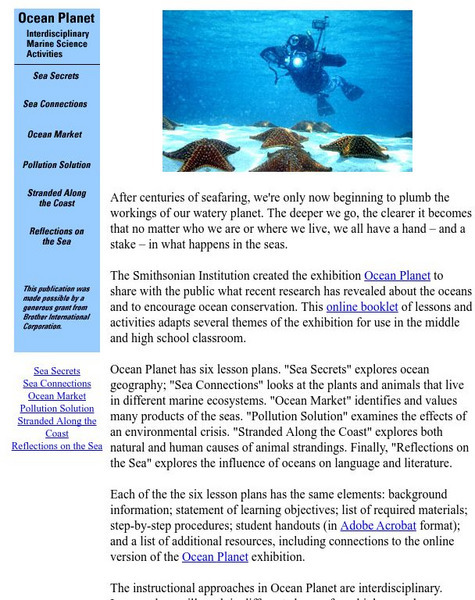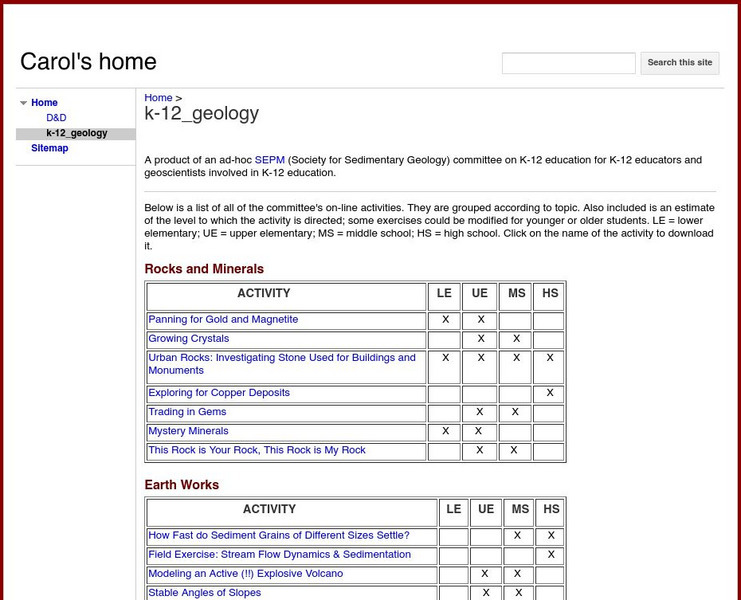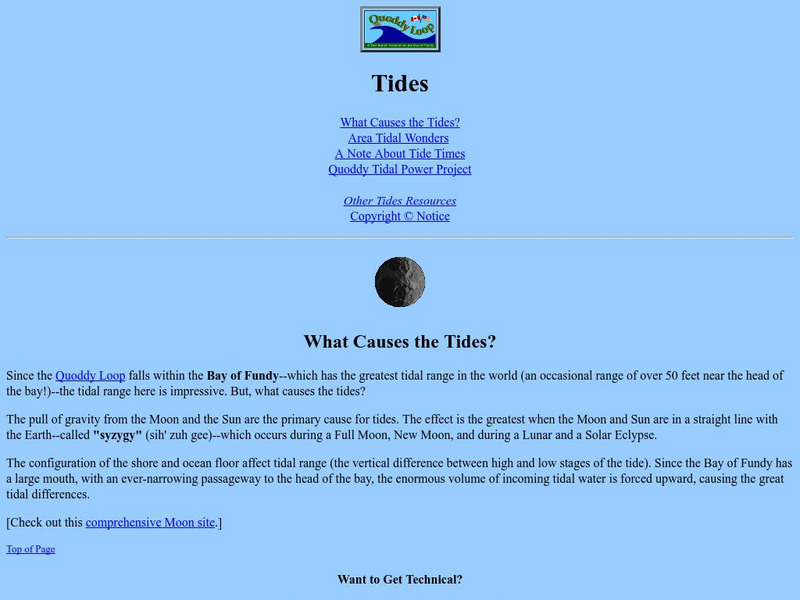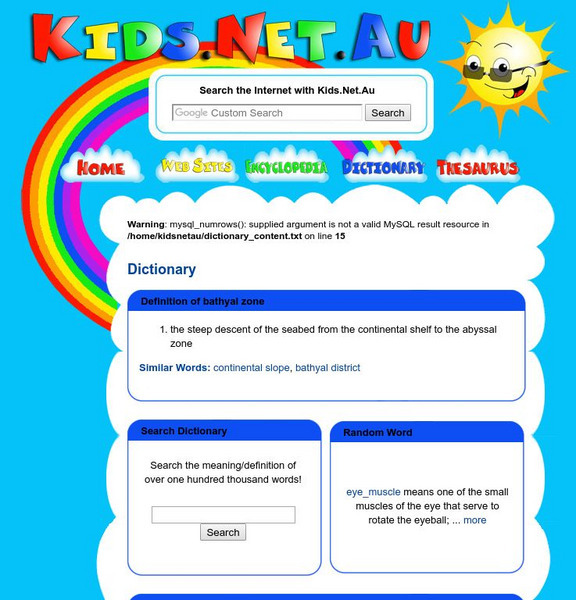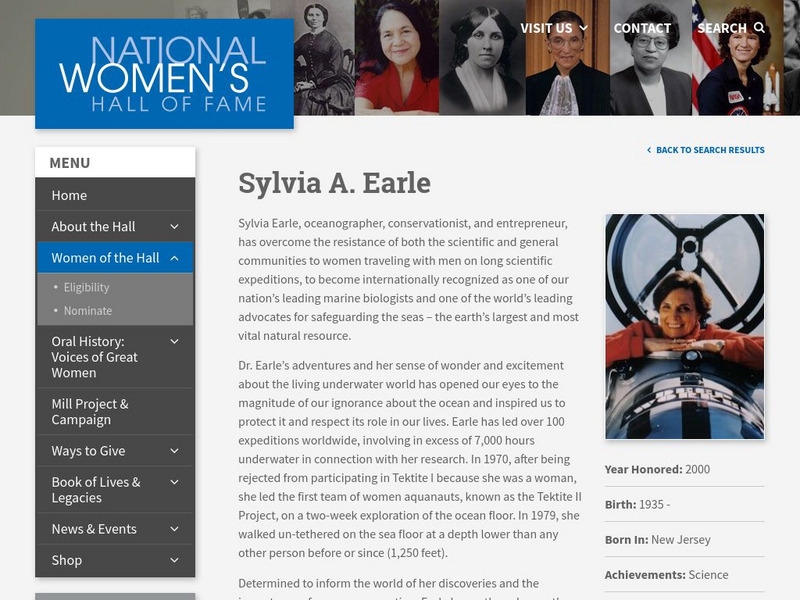Simon Fraser University
Chem1 Virtual Textbook: Chemistry and Geochemistry of the Oceans
As part of the General Chemistry Virtual Textbook, this site examines a variety of topics related to the oceans. Topics covered include composition of seawater, conservative and non-conservative substances, organic matter, and more.
Missouri Botanical Garden
Missouri Botanical Garden: Fa Qs About Temperate Oceans
Learn why the ocean is blue. Learn the names of the oceans and how they received their names. Learn how the ocean forms waves.
Smithsonian Institution
Smithsonian Education: Ocean Planet
A series of lesson plans designed to be used with the Smithsonian Ocean Planet exhibit (available online). Lesson topics include marine ecosystems, pollution of ocean water, animal strandings, and literature.
Wikimedia
Wikipedia: Bathyal Zone
Learn where this ocean zone is located, average temperature and the unique traits of the animals that reside there.
NASA
Nasa: Creeping Dead Zones
Dead zones are popping up along coastlines all over the world. Find out what they are and the causes of this destructive phenomenon.
Math Science Nucleus
I. Science Ma Te: Integrating Science, Math and Technology
This site offers a wealth of online textbook-related materials that encourage the discovery of science in the world around us. Enter the site to access material on specific topics. Each section contains reading material (complete with...
Encyclopedia of Earth
Encyclopedia of Earth: Abyssal Zone
This in-depth resource discusses the abyssal zone of the ocean. Includes a diagram and many facts about this zone.
TED Talks
Ted: Ted Ed: 7 Things We Don't Know About the Ocean
The ocean covers 70% of the planet, but humans still don't know very much about it. In this video, Hank Green from SciShow discusses seven mysterious ocean topics. [10:31]
TED Talks
Ted: Ted Ed: On Exploring the Oceans
Ocean explorer Robert Ballard takes us on a mindbending trip to hidden worlds underwater, where he and other researchers are finding unexpected life, resources, and even new mountains. He makes a case for serious exploration and mapping....
PBS
Pbs Teachers: Predator Protector Game Lesson
Describe the habitat, food web and ecosystem of shark species. Identify threats to sharks and explore how top predators help to maintain the balance of nature within ecosystems. This lesson plan also contains an interactive game.
PBS
Pbs: Secrets of the Ocean Realm
At this site students can read about sea creatures and ocean plant life, and see pictures of each.
Other
Reef Base
This is a database on coral reefs where you can access coral reef data, take quizzes on corals, view images, get maps of reefs and more.
Other
Discovery Kids: Jimi Rock Undersea Adventures
Students can learn about the world's oceans in this safe, online, undersea world. Visit virtual dive sites, create characters, and play aquatic-themed games. Students can play some games free, or they can sign up for a membership for a...
NOAA
Noaa: Imagery Portal
NOAA View provides access to maps of NOAA data from a variety of satellite, model, and other analysis sources. NOAA View is intended as an education and outreach tool and is not an official source of NOAA data for decision support or...
Other
Beloit College: K 12 Geology
This is a good source of basic information about density currents in water. It includes simple activities you can do to demonstrate these currents.
Other
Quoddy Loop: Tides
This resource gives an in-depth description of the Quoddy Loop of Islands within the Bay of Fundy. This area has the greatest tidal range in the world. Learn what causes these massive tides.
The Franklin Institute
In Quiry Almanack: Undersea and Oversee
Dive into a greater understanding of the oceans by tagging along on this exploration of the oceans.
San Diego State University
San Diego State University: Researching Research
This comprehensive unit site from the San Diego State University is geared towards seventh grade math and science students. "Students will chose a research project currently in progress and research it using traditional techniques, the...
Australian Broadcasting Corporation
Australian Broadcasting Corporation: Oceans Alive: Cool, Wet Facts
Did you know that turtles migrate 1400 miles to lay their eggs? Did you know that penguins swim underwater at 55 MPH? Click on this site to learn more interesting facts.
Other
Lunar and Planetary Institute: Oceans From Space
This collection of photographs from space-shuttle missions shows some features of oceanic circulation that simply cannot be seen from any other vantage point. This site is a great resource for many different topics of study.
National Geographic
National Geographic: Geostories: Ocean Exploration
This Geostory illustrates pivotal events in undersea understanding.
National Women's Hall of Fame
National Women's Hall of Fame: Sylvia Earle
Inducted into the Women's Hall of Fame in 2000, Sylvia Earle is an internationally recognized marine biologist, author, and oceanographer. Here you can read about her most adventurous and fascinating life.
NASA
Nasa: Climate Kids: What Is Happening in the Ocean?
Find out why the oceans on Earth are so vital to the cycling of matter and energy through its spheres.
Other popular searches
- Oceanography Science
- Oceanography Activities
- Oceanography Vocabulary
- Oceanography Tides
- Introduction to Oceanography
- Oceanography Exploration
- Oceanography Lab
- History of Oceanography
- Careers in Oceanography
- Oceanography Shells
- Geological Oceanography
- Oceanography Careers




